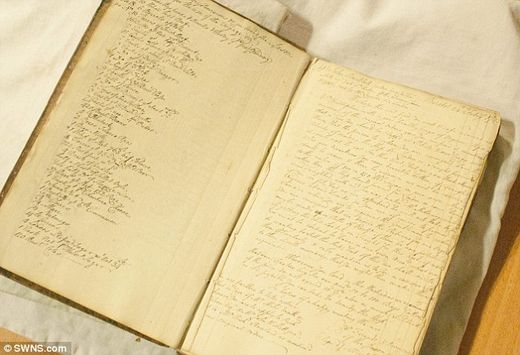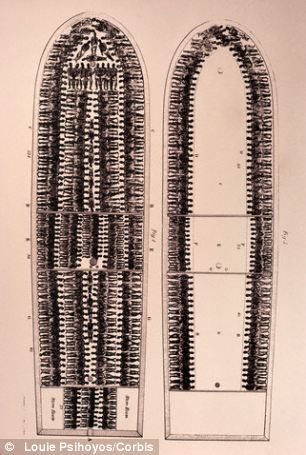
Cranfield Becher's written instructions order the captain of the Jason Gally to swap brandy and guns for 'as many Negros as our ship can carry'.
He specifies that the slaves are 'not too old or decrepit' and his entries make it clear that he views the unfortunate people as simple commodities to be bought and sold.
The financial log details the commissioning of the Jason Gally to sail from Bristol to Africa to buy slaves between 1743 and 1746.
Disturbing handwritten instructions demand that the ship's commander should exchange the cargo on board, which was worth £2,742, for slaves in Angola.
The enslaved people were then taken to Carolina where they were sold for just £18 each for rice and sugar, which was brought back to Bristol.
The calfskin-bound book was bought at auction last year for £7,000 by the Bristol Record Office and has gone on display this week in the city.
Extracts from the fragile tome reveal that Mr Becher considered the slaves he bought to be mere 'commodities'.

Bristol became a wealthy port during the slave trade, with more than 2,000 ships leaving the city to make a trip to Africa and then across the Atlantic with around 500,000 slaves.
The details in the notebook include the exact costs of kitting out the ship, the value of the cotton goods, brandy and guns put on board in Bristol and the profits brought back on the return leg.
The notebook reveals that slaves were 'immediately marked on their coming on board' and contains instructions to sell them for 'no less price than eighteen pounds sterling money per head round'.
Mr Becher ordered crew members to look after the slaves, but always keep guard to prevent mutiny.
He wrote: 'On board ... taking especial care that your Negroes be duly fed, attended and not abused by your sailors, likewise that such a strict guard be continually kept over them that you may not be surprised by their mutiny, which you are sensible often happens (though so easily prevented) and have been of the most fatal consequences.'
Warning against disease-ridden visitors on board, he added: 'Epidemics & distempers have been convey'd to the destruction of many voyages, besides the great loss in the lives of many white men.'
Dr Madge Dresser, associate history professor at the University of the West of England, Bristol said the account book offered a 'rare insight' into racial attitudes of the times.
'It details, for example, the transactions between Bristol merchants and their Carolina agents who speak of 'Negroes' as trading commodities for whom a good price must be obtained in precisely the same tone as they discuss the rice and deerskins they also trafficked,' she said.
'It also records the networks of prominent Bristolian men who governed the city and also came together to do business in the triangular and transatlantic trades.'
Mr Becher moved from Ireland to Bristol in the late 17th century and rose through the political ranks while trading in a number of goods.
The book was bought from his family at London's Bloomsbury Auctions in September last year with funds raised by the Friends of Bristol Museums and Archives and the Victoria and Albert Museum.
The fragile book has been digitised for future study and assistant mayor Simon Cook said it serves as a reminder that the city was once at the heart of the slave trade.
'It is a deeply moving account of a particular time in Bristol's history,' he said.
'Trading in human life to make money in any era makes for chilling reading and it is through access to these original sources that we are better able comprehend the city's past.
'And while we readily acknowledge and take comfort from the fact that many Bristolians were amongst the most vocal and active abolitionists, we should never forget that some of the city's forefathers were at the heart of the slave trade.'



I wonder if a trail can be found of religious or other brainwashing linked to slave trader cultures (is western world the correct term?) that encouraged high birthrates in order to guarantee labour supplies.
Sounds like a research project for me for some time between now and reset.